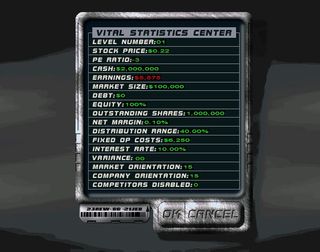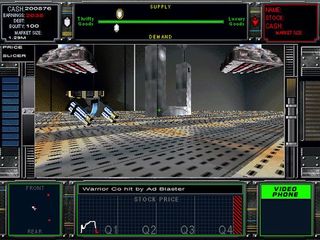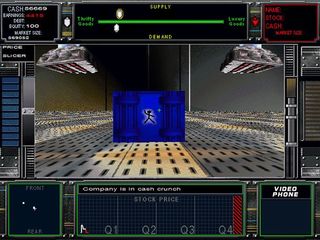Crapshoot: Shoot the 'Marketing Missile' in Forbes Corporate Warrior
We're rerunning Richard Cobbett's classic Crapshoot column, in which he rolled the dice and took a chance on obscure games—both good and bad.

From 2010 to 2014 Richard Cobbett wrote Crapshoot, a column about rolling the dice to bring random obscure games back into the light. This week, it's time to get down to business. Serious business. Seriously awful game. But can it educate as well as enterta... well, at least educate?
Forbes claims it provides "Information for the World's Business Leaders," and that's quite a lofty goal. The total of my business knowledge is that trying to monetise puns by charging money to go away is not deemed Dragon's Den-worthy, even when presented as a Smaugusboard of opportunity.
Still, we can probably assume a couple of things. First, that whoever ran the magazine when Corporate Warrior came out could spot a good thing when they saw it. Second, that there's no way—no way whatsoever—that any self-respecting business guide would ever squander the name it had built up over the years on anything but the most realistic simulation engine 1990s technology could possibly create.
Yes, I think we're all going to learn something today. Or as Christopher L. would say...
Sim-plicity: I am an awesome businessman of the future

Business is a complicated... well, business. You need razor-sharp instincts. A keen eye for opportunity. A firm handshake. The ability to stay awake during PowerPoints, even when the presenter has just said "I'd like to talk you through the current market landscape" and everyone in the room is imagining him hanging upside down from a bridge with a railway spike through his sternum. That kind of thing.
Forbes Corporate Warrior wisely avoids throwing you in at the deep end. Instead of trying to take the helm of a giant like Microsoft—the Microsoft of the '90s, when it was still a respectable evil empire—or the now forgotten Spunky Puddle Chicken 'n' Biscuit Emporium, you're the head of a new start-up looking to make it big in the near-future corporate jungle. Well, that makes sense. No need to worry about real brands, and the big decisions and financial information required can be simplified for the sake of accessibility while still remaining contextually comprehensive and believably presented.
The biggest gaming news, reviews and hardware deals
Keep up to date with the most important stories and the best deals, as picked by the PC Gamer team.

We're off to a good start. Nice one, Forbes!
"Forbes Corporate Warrior takes place in a futuristic, cutthroat, capitalistic, electronic world where all business transactions are conducted in one giant virtual arena," explains the manual, a little overenthusiastically, but never mind. "There are no borders, no countries, and just three rules. Supply what your customers demand. Elevate your stock price. Constantly refresh your cash stream."
Makes sense. Buy high. Sell low. I think that's how business works, anyway.

This complicated looking screen tracks your business's progress. Your PE ratio is the amount of time of the year devoted to failing at rugby versus failing at cricket versus managing to slip off to the library and hide for an hour or so every week. Cash is what people who don't write about obscure games for a living have in their bank. Equity is the right of every horse to be treated the same. Outstanding shares are the ones that have performed especially well, and are given their choice of the village chickens. To start with, you get $2,000,000 to spend and haven't even started making anything. That's how impressive Forbes Corporate Warrior is, predicting the silicon bubble almost... ooh, five minutes early.
With all this highly important information at hand though, it's time to start.
"Forbes Corporate Warrior satisfies your megalomaniacal urge to capture world markets, wage war on the competition, and get insanely rich in the process," the manual continues, pounding its invisible fists against the table. "Cash is ammunition, and amount of cash is your health!"
Okay. Pushing the 'war' metaphor a little strongly there, game, but—

Yes, Forbes Corporate Warrior is a shooter. One of the worst shooters ever made. All the business talk, all the grandstanding, is utter and complete bullshit. When it says "Fight and capture competitor's customers with nine futuristic weapons of business", not only is it committing apostrophe crime, it's talking about guns. Guns with names like "Ad Blaster" and "Marketing Missile".
The action takes place in a world that makes the Game Grid from Tron seem like a bustling metropolis—a huge empty void with occasional random logos rolling around it. If you haven't read the manual, there's no possible way to understand what you're meant to be doing. If you have, it's actually slightly more confusing. Forbes Corporate Warrior is one of those games which would actually have been better off embracing the fact that nobody in their right mind could possibly enjoy this concept and just pull a Chex Quest with dollar signs. There's some dignity in that degree of laziness.
But no. Instead, it really, really wants to try and implement some kind of business element. For starters, as it said, cash is your health. Everything you do drains your health, from firing to moving around what can jokingly be called 'the map'. This is littered with competitors, who have to be blasted, and new markets to be seized, all of which are a bit difficult when your eyes are rolling fast enough that if you could stick it in a motor, you could light up Paris for a week. Maybe a month.

"Your company makes anything or performs any service you can imagine," continues the manual, though I can't help but suspect it's talking about its own designers when it subsequently adds. "It doesn't matter what you make or do." Or maybe not, since it also talks price and "quality".
This is represented by a bar that tracks the variance between the absolutely nothing you're supplying to anyone, and the grade of nothing that your customers demand. This translates to 'press A and Z to move an icon on a bar'. At the same time, you have to steal competitors' customers by deploying demonstrations of your own quality, using your industrial espionage skills to determine their current vulnerabilities and strike at the perfect opportunity. You guessed it. "Shoot them with a laser."
Weapons are split into several categories. "Ad Blaster" and "Marketing Missile" are used against competitors producing cheap goods for upscale customers, like anyone who's made a laptop intended to appeal to Macbook Air owners. Flip the scale, and Price Weapons are used when they're aiming too high. If this sounds confusing, it's because someone has gone to great lengths to make it so.
Along with this system, you get Special Weapons, which really start getting desperate. "Head Hunter" makes it more expensive for them to move around the map, due to losing top talent. "Distribution Disrupter" pinches their weapons. "Legal Laser" freezes them in place. Finally "Takeover Torpedo" is just... sad. I mean it. Drowning kittens on Christmas Eve sad. Really cute ones.

The actual game is irrelevant after a while—it's the manual that's the star of the show. In complete sincerity, or at least so it comes across, it has to present instructions like "The PAC (Political Action Committee) Shield protects you from competitors and is activated by pressing "S". The cost of keeping your PAC shield on is computed as a percentage of your cash on hand."
That's exactly how that works in real life!
Still, my favourite bit comes near the end. It starts reasonably enough, I suppose, promising "The business model in this game makes some basic assumptions about business. Knowing them will help you succeed as a Corporate Warrior." Can't argue there, especially with the 'basic' bit, but either way, can't blame a game for trying. On the same page though—repeat, the same page of the manual—comes the following bit of advice: "Shooting the alliance harpoon makes your competitor an ally."
THE ALLIANCE HARPOON.
Nothing can top that. Nothing.
I have no idea how this game came about, though I can't help suspecting some form of executive sadism might have been involved. This was published by Simon and Schuster, and it wouldn't be the first time one of their game assignments was met with a "You can fire me now, or you can, like, not make me do this..." from the poor developer responsible. The idea of someone rolling around in bed desperately trying to think of anything to do with the Forbes name is at least easier to fit into reality than someone walking into an office one day and announcing "I know exactly what the world needs!"
Incidentally, a couple of years later, the same publisher released this:
So... yeah. Quality was clearly its top priority back then. Ahem.
What I can say for sure though is that if you want to strike it rich, and your choice is robbing a bank or relying on this game to give you the necessary knowledge... rob the bank. For no reason other than that I really want to see what the newspapers would make of the story. I think it could be hilarious. Your sacrifice, unlike any work that went into Forbes Corporate Warrior, would not be in vain.
If you enjoyed this, please hit the social buttons to let your friends know, or simply tell them the old fashioned way. This week's Crapshoot was regulated by the SEC, FCC, MRSA and AFGANCAAP. Money is the root of all evil. Save your soul; send it all to PO Box 47(Snip! -Ed)

Palworld developer reports Nintendo's suing over 3 Pokémon patents for only $66,000 in damages, but a videogame IP lawyer says fighting the lawsuit could mean 'burning millions of dollars'

No Man's Sky gets cross-save on a dozen platforms and brings back Mass Effect's Normandy as a limited-time rewar
Most Popular

